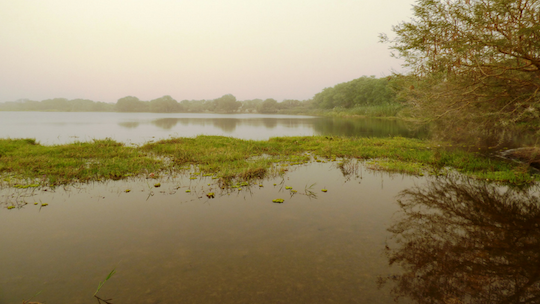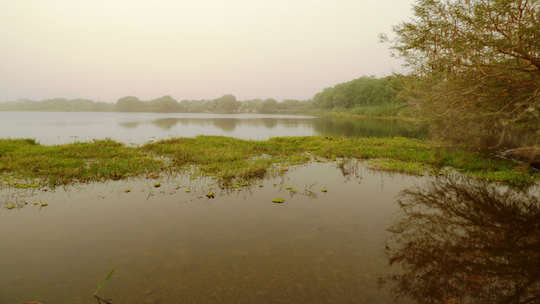Lake Chad, a large, shallow body of freshwater in North Central Africa, is vitally important to the livelihood of tens of millions of people living in the semi-arid, remote and impoverished region. Over the decades, the area’s inhabitants have adapted to extreme conditions affecting their water resources.

While governments and international authorities have pushed a narrative by which the lake is drying out due to climate change, there is a lack of published data or studies to support these claims. This was the impetus for a team of researchers from Rice University and Imperial College London to develop an innovative approach to studying and telling the story of Lake Chad and its agrarian people — using statistics.
Frederi Viens, a professor in Rice’s Department of Statistics, and Philip Ernst, chair in statistics and Royal Society Wolfson Fellow at Imperial College London (and formerly a professor at Rice), are the recipients of a grant from the British Academy and the Wolfson Foundation for their study, “Sustainability of Agrarian Societies in the Lake Chad Basin.”
During their three-year research project, Ernst and Viens will study how the Lake Chad Basin’s farmers and pastoralists in Northeast Nigeria have operated over the long term and dealt with difficult circumstances, including devastating droughts in the 1970s and 1980s. In particular, they will look at whether these methods are sustainable over the next century as the area’s population and potential for adverse climate events grow.
“We are extremely honored that the British Academy, the U.K.’s national academy for the humanities and social sciences, has chosen to award one of their seven British Academy/Wolfson Fellowships to support our research efforts on the sustainability of agrarian societies in Lake Chad,” Ernst said. “To the best of our knowledge, we are the first mathematical scientists to be supported by the British Academy under this fellowship scheme since its inception in 2019. We very much look forward to using statistical evidence to support the myriad strengths of the agrarian societies in the Lake Chad Basin.”
“We are delighted that the British Academy has entrusted us, as statisticians, to shed light on what challenges these resilient agrarian people are capable of overcoming and what could make their lives a little easier, based on hard evidence, including survey data we plan to collect directly on the ground, not based on the political discourse of Western-based international aid agencies or think tanks,” Viens said. “The lack of information coming out of northeast Nigeria has been an endemic problem since Boko Haram, one of the world’s most notorious terrorist groups, started operating in the region two decades ago. But that should not be a carte blanche to make up narratives based on no evidence. Our connections with Nigerian officials and academics will facilitate this work.”
The research team will work with African colleagues and local stakeholders, including village chiefs and elders, as they create a comprehensive climate and agriculture dataset and analyze it using probability models and Bayesian statistics . Their primary collaborators in Africa include: Udo Herbert, deputy vice chancellor (academic) and professor of animal physiology at Michael Okpara University of Agriculture in Umudike, Nigeria; Dennis Ikpe, research associate at the African Institute of Mathematical Sciences in Cape Town, South Africa, and data scientist in the Office of Institutional Research at SUNY Binghamton in New York, United States; and Bethel Ukazu, project team leader at Thels Impact Consulting, a development cooperation firm in Abuja, Nigeria.
They plan to bring into the discussion other academics with whom Viens has been in contact over the years about agrarian lives in the Lake Chad Basin, including Nigerian research specialists in meteorology and in natural resources and members of the G-EAU water resources research group at the Institute for Development Research in Montpellier, France.
Ernst and Viens are currently working with Herbert, Ikpe and Ukazu to organize a unique symposium on agrarian lives in the Lake Chad Basin. It will be held at the University of Maiduguri in Northeast Nigeria’s Borno State May 7-8. This meeting will bring together academic researchers, government officials, members of the development economics community and local rural stakeholders including village chiefs and elders. A main objective is to provide a forum for academic and professional actors to listen to these villagers’ stories and accounts and understand more about day-to-day living in the Lake Chad Basin’s rural communities in Nigeria.
Ernst and Viens hope their research will provide new insights into this understudied region for its more than 30 million residents who rely on the lake’s basin as part of their livelihood.
More information on the grant and its fellowship program is available online here.

